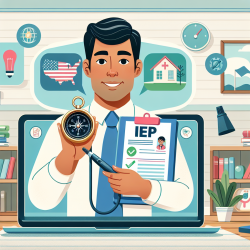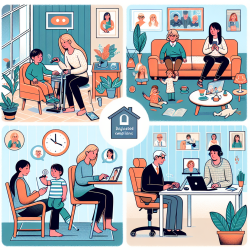As Speech Language Pathologists (SLPs), the impact we have on our students' lives is profound, yet navigating the intricacies of Individualized Education Program (IEP) planning and meetings can sometimes leave us feeling burnt out. With the increasing adoption of online therapy and the unique demands of speech therapy in schools, it's essential to approach these responsibilities with strategies that not only support our students but also preserve our well-being.
Understanding the IEP process from a parent-friendly perspective can empower SLPs to communicate more effectively and foster a collaborative environment. Here are several strategies to manage the demands of IEP planning and meetings:
- Start Early: Begin preparation for IEP meetings well in advance. This allows ample time to gather assessments, progress reports, and any other relevant information. Utilizing online therapy platforms can streamline this process, making it easier to compile and share documentation.
- Embrace Technology: Online therapy services, like TinyEYE, offer innovative tools that can enhance the IEP process. From virtual assessments to interactive therapy sessions, these resources can provide valuable insights and support tailored learning outcomes.
- Focus on Collaboration: IEP meetings are a team effort. Engage with parents, teachers, and other professionals as partners in the student's education. Clear, jargon-free communication can help demystify the process for families and encourage their active participation.
- Practice Self-Care: The demands of IEP planning and meetings can be taxing. Prioritize self-care strategies that work for you, whether it's mindfulness exercises, physical activity, or pursuing hobbies. A well-rested and mentally healthy SLP is more effective and can provide better support to their students.
- Seek Support: Don't hesitate to reach out to colleagues or professional networks for advice and support. Sharing experiences and solutions can provide new perspectives and reduce the feeling of isolation that sometimes accompanies this work.
- Stay Informed: Keep up to date with the latest developments in speech therapy and special education. Attend webinars, read publications, and participate in conferences to enhance your skills and knowledge.
IEP planning and meetings are critical components of our role as SLPs in schools. By starting early, embracing technology, focusing on collaboration, practicing self-care, seeking support, and staying informed, we can navigate these responsibilities more effectively and with less stress. Remember, the goal is to create a supportive learning environment that enables our students to thrive. By taking care of ourselves and leveraging the resources available to us, we can continue to make a significant impact on the lives of the children we serve.
In conclusion, the journey of supporting students through IEP planning and meetings is both challenging and rewarding. As we continue to adapt to the evolving landscape of speech therapy in schools, including the integration of online therapy services, let us remain committed to our professional growth and the success of our students. Together, we can overcome burnout and foster an environment of collaboration, understanding, and excellence in special education.










